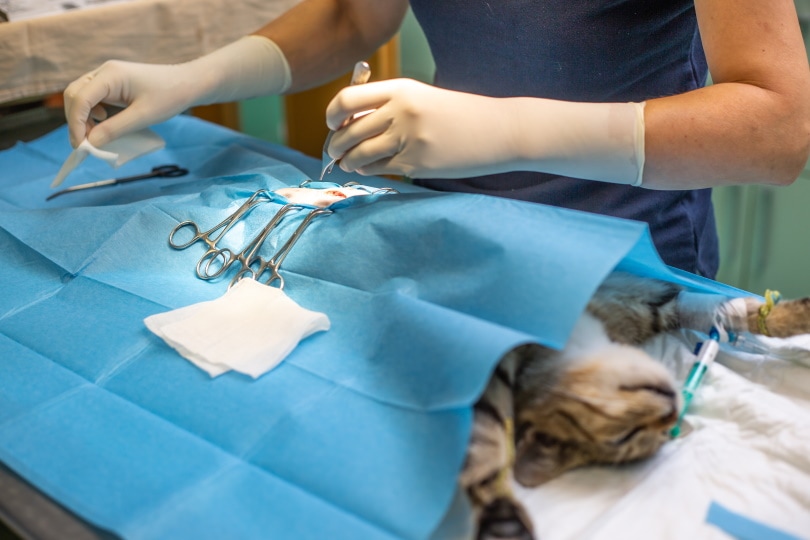
Spraying is known as that irritating habit your cat displays when they begin urinating outside their box to mark their scent. It’s usually accompanied by meowing and other feline noises, but not always. If your cat has suddenly picked up this unfortunate habit, keep reading while we list several reasons that can cause it as well as what age it usually starts occurring which is usually around 6 months of age. We’ll also tell you what you can do about it.
When Do Male Cats Start Spraying?
Most male cats begin spraying at about 6-7 months after reaching puberty around 4-6 months old.
The 3 Reasons Cats Spray
1. Sexual Maturity
The primary reason cats spray is because they’ve reached sexual maturity, and it’s their way of letting other cats know they’re available for mating. A cat trapped indoors that goes into heat can make quite a mess out of your home as it usually doesn’t stop with the urinating. Continuous howling and rubbing at the furniture and drapes are also likely to occur.

2. Territory Marking
Cats are territorial animals and may mark their territory using urine, just like dogs do. It’s more likely to occur if other cats come into the yard or you suddenly bring a new cat into the home. It’s also more common in male cats.
3. Anxiety
Anxiety is another common reason that cats spray in the home. Your cat may suffer from anxiety if you bring another cat home, especially a second male cat. However, loud noises from things like yelling or traffic can also upset your cat if they continue long-term. Other signs of anxiety include dilated pupils and overgrooming.

Important Information to Consider
In order to eradicate your cat’s spraying behavior, the first step is to get rid of their urine’s smell from the surfaces they have marked. The most effective way of completely removing the smell is by using enzymatic cleaners designed to dissolve uric acid crystals.
These types of cleaners break down the organic molecules to completely remove any odor and eliminate stains.
If you're trying to find an enzyme cleaner that does it all, we highly recommend our favorite cleaner, the Hepper Advanced Bio-Enzyme Pet Stain & Odor Eliminator Spray.
- ADVANCED ENZYMATIC CLEANER - Penetrates the most stubborn smells and stains at the deepest molecular...
- FOR ANY MESS, ON ANY SURFACE - This pet odor eliminator cleans your carpets, floors, furniture,...
- FRESH, NATURAL ODOR - Our unique formulation doesn't rely on dangerous or unpleasant chemical...
It permanently removes the very worst stains and smells you can imagine and makes clean up a breeze. There's even a 100% satisfaction guarantee! Click here to order a bottle today.
At Pet Keen, we’ve admired Hepper for many years, and decided to take a controlling ownership interest so that we could benefit from the outstanding products of this cool cat company!
Are There Benefits To Getting My Cat Spayed Or Neutered?

Summary
If you don’t get your cat spayed or neutered, you can expect it to start spraying and having erratic behavior once it reaches sexual maturity, on average at about six months old. If you have a female cat, she will no longer go into heat after being desexed. The behavior and spraying should subside, and your cat will be friendlier and more stable. However, if the spraying behavior has been hard-wired into them before the procedure, some cats may continue to spray, and you will need to address those issues with a different approach that may include enzymatic cleaners and pheromone diffusers.
See also:
Featured Image Credit: Anlomaja, Shutterstock







